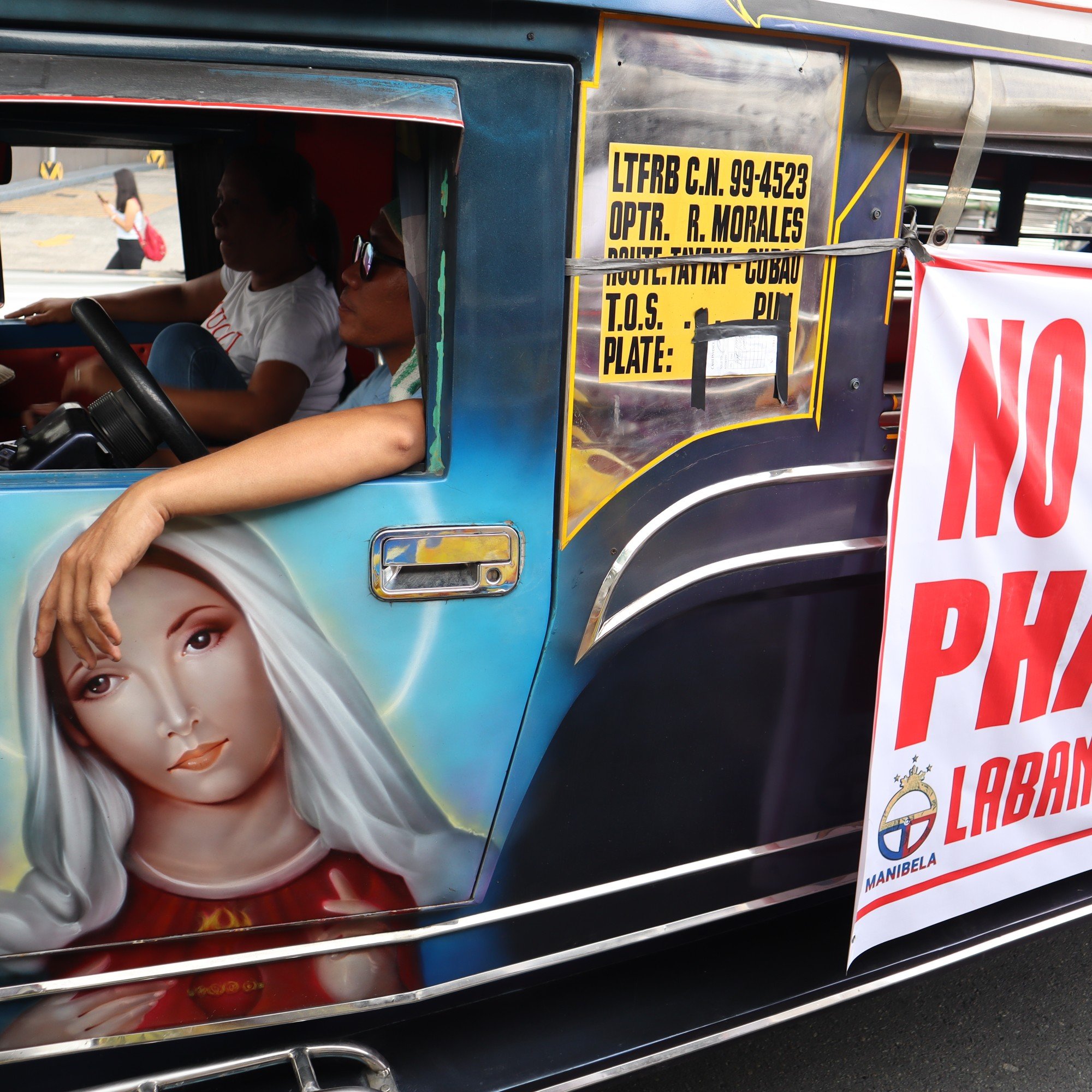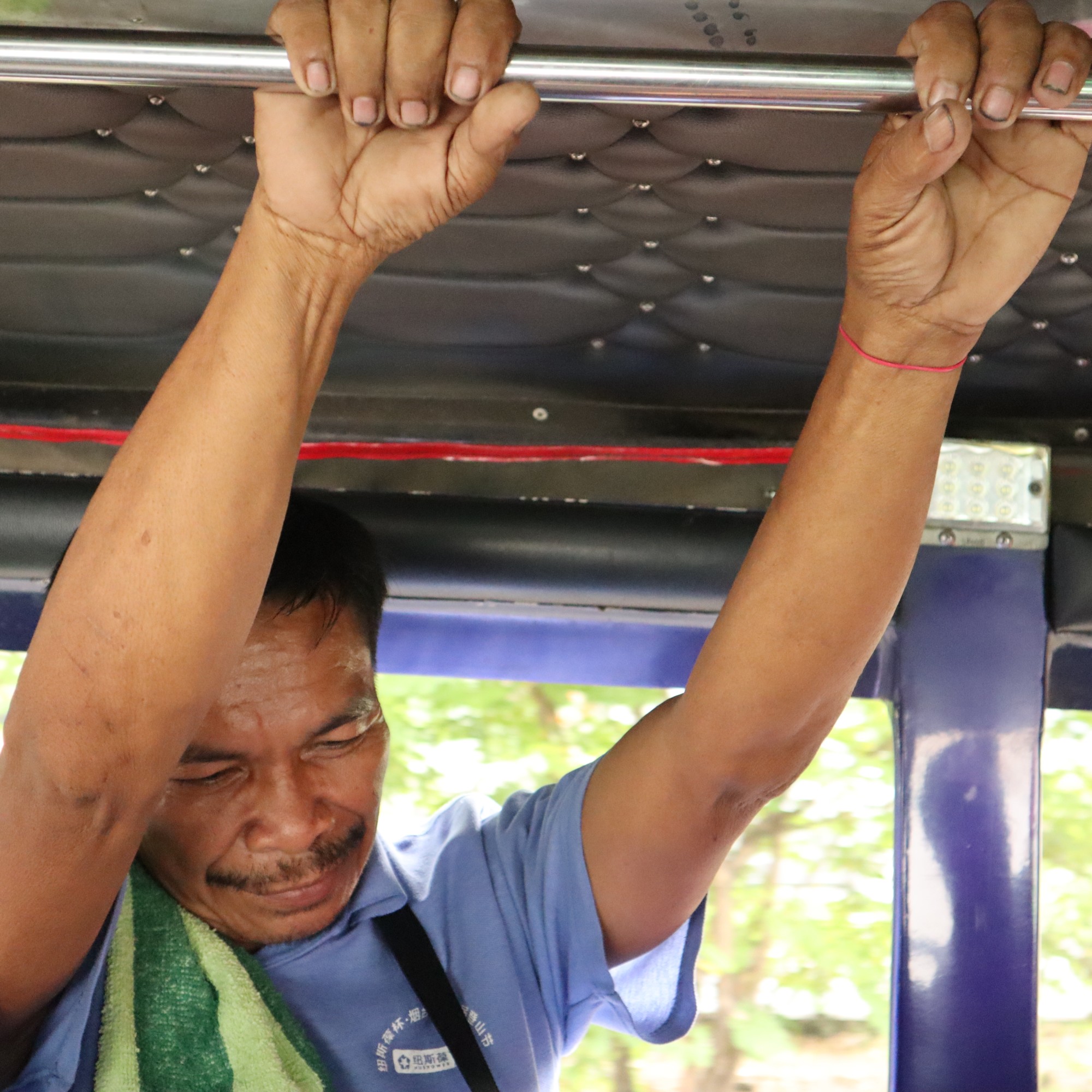When the programme goes into effect on Monday, all traditional jeepneys that are at least 15 years old will lose their government-issued franchises and will no longer be able to operate legally as public utility transport.
When the programme goes into effect on Monday, all 41,918 of the country’s traditional jeepneys will lose their government-issued franchises to operate as public transportation. However, temporary permits to continue operating will be provided to owners who tell the government by Sunday that they will take part in the PUVMP’s “consolidation programme” by joining or forming cooperatives to acquire modern Public Utility Vehicles (PUVs).
Philippines’ jeepney drivers go on strike again amid livelihood fears
Philippines’ jeepney drivers go on strike again amid livelihood fears
Jeepneys have been a mainstay of Philippines public transportation for the last seven decades. Although their drivers are known for their recklessness, the vehicles have become a beloved icon for their flamboyant paint jobs, decals and gilded accessories.
However, there have long been efforts to replace the ageing, exhaust-spewing minibuses with more eco-friendly alternatives.
Under the PUVMP, all Public Utility Vehicle (PUV) operators and drivers are required to consolidate into cooperatives that need to be made up of at least 15 “modern” PUVs, which are either powered by lithium-ion batteries or an engine that is compliant with “Euro 4” standards for lower emissions.
Individual PUV operators will also no longer be able to own their vehicles or hold onto the franchise allowing them to work as public transport under the new scheme, but they would be required to shoulder the burden of paying off the bank loans required for buying the new modern PUVs, which cost at least 2.8 million pesos (US$50,000) each.

Ownership of the vehicle, its licence plate and franchise would then be handed to the cooperative registered with the Securities and Exchange Commission.
Manibela, a transport association that represents 100,000 PUVs, has refused to consolidate under the scheme, which the group’s president called “unjust.”
Manibela’s chief Mar Valbuena said to This Week in Asia on Thursday: “I would be forced to pay for an asset but will not have the right to own or control that asset. Instead, it will be owned by the cooperative, along with the franchise. A simple resolution by the (cooperative’s) board can ease me out of the coop and the asset I paid for will be left with them.”
Valbuena said Manibela wants the ownership aspect of the programme to be amended and for the government to contribute a bigger chunk to each unit’s cost instead of a “measly” 360,000 pesos each.
Valbueana stressed that Manibela was not against jeepney modernisation to reduce air pollution but said there were cheaper alternatives to the vehicles required under the PUVMP. He said his group had come up with 10 locally assembled prototype units that utilised Euro 4 compliant engines while still costing less than 700,000 pesos each. Manibela has written to the president about this and recommended changes to the programme, but never received a reply, he said.
Friday’s protests – centred in front of the presidential palace in Manila and supported by rallies in various other cities including Davao – saw angry protesters calling the president names like “bobo” (idiot) and “traidor” (traitor) for turning his back on the 2022 presidential election campaign promise he had personally made to jeepney drivers that he would not phase out their vehicles all at once.
Jun Rodriguez, a jeepney driver and father of seven, skipped work to join Friday’s protest because he said the scheme would make him jobless. “My body and health will not be able to take the hours,” he told This Week in Asia.

He explained that at the age of 65, it would be hard for him to join a coop, which preferred younger drivers due to the punishing work hours. He said drivers who had joined coops told him their work hours usually began between 3am and 4am, and ended at 1am the next day.
They worked long hours because the coop required drivers to shell out 4,000-5,000 pesos daily to cover the amortisation of the unit, the monthly wages for both drivers and conductors, plus sundry costs.
Rodriguez drives from 5am-10pm daily to pay for diesel and the 1,450 pesos boundary fee imposed by jeepney operators. He said he earns 1,000 pesos most days.
Jon Gurrea, who drives for ride-hailing service Grab, said he sympathised with jeepney drivers because they would be heavily burdened by the high amortisation cost of new vehicles. He noted that the modern PUVs cost more than twice the car he operates as a self-owned transport taxi.
Bank security guard and jeepney user Severino Cucal said he supported the strike because “commuters like me will also suffer when jeepneys are phased out since there isn’t enough transport. I can bike to work but what about my wife and my kid? What will they ride?” he asked.
Land Transportation and Franchising Regulatory Board member Mercy Paras-Leynes tried to reassure the public during a press conference on Friday, saying “we see no transport crisis come 2024”.
Philippine drivers signal anger as Marcos makes U-turn on jeepney promise
Philippine drivers signal anger as Marcos makes U-turn on jeepney promise
She said commuters could simply switch to buses and taxis and that the consolidation programme was proceeding smoothly. She said that in Metro Manila alone, 13,833 units had already joined and, although this number pointed to a consolidation rate of just 33 per cent for the metropolis, most of the consolidated units were plying major routes so she didn’t expect commuters to have problems.
Paras-Leynes added that all jeepneys that remain “unconsolidated” by January 1 would be sent “show cause orders” asking why their franchises should not be revoked – as part of due process – but would otherwise be forever barred from forming or joining coops. Transport groups estimate that over 100,000 drivers could be become unemployed.
It was for this reason that a national federation of transport groups filed an urgent motion with the Supreme Court on December 20 for a temporary restraining order and/or preliminary injunction against the government programme.
The high court did not grant the requests, but on Friday ordered the Land Transportation Franchising and Regulatory Board (LTFRB) and the Department of Transportation and Communications to respond to the petition within 10 days.
Neri Colmenares, a lawyer for transport association the Solidarity of Drivers and Operators’ Organizations Nationwide, told This Week in Asia “this is really an unprepared, ill-thought out, ill-studied project, which is not abnormal for government”.
He predicted that the unilateral revocation of all franchises of unconsolidated jeepney units would lead to “commuter chaos” because transport was already a major problem in Metro Manila and “once you cancel 30 per cent of the jeepneys there, it will be more difficult for commuters”.
President Marcos Jnr’s eldest sister, Senator Imee Marcos, who is running for reelection in 2025, appeared to go against her brother’s wishes on Thursday when she called on the LTFRB to take back the “deadly deadline” for the PUVMP’s implementation and to restart talks with affected operators, drivers and commuters instead.

